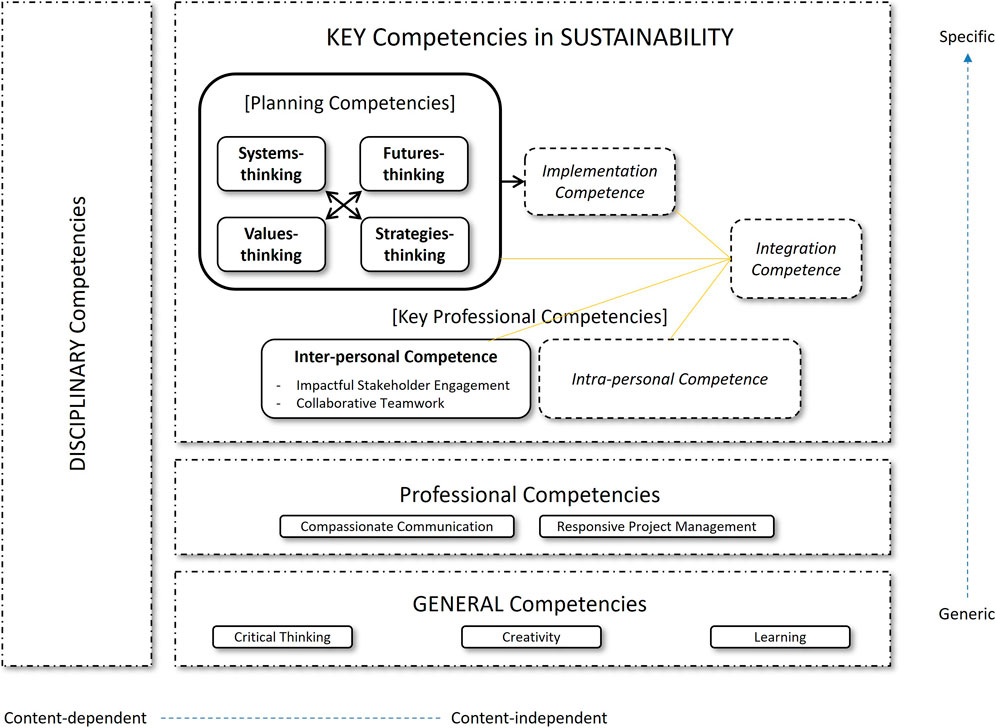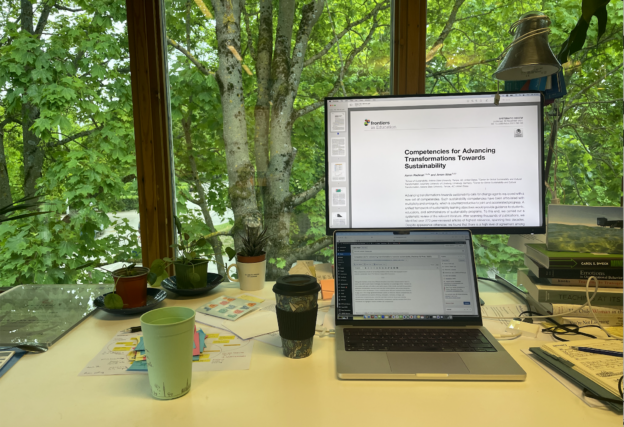What competencies should we be teaching students so they will be best equipped to work towards a sustainable future? The (really useful, me thinks!) Redman & Wiek (2021) framework.
Talking with teachers across many different disciplines about what students need to learn in order to be able to tackle future challenges, the responses are surprisingly similar. Teachers list that students will need to be able to work well in teams, think critically, deal with fuzzy problem statements and problems that don’t have one clear correct solution, work across disciplines, … The same is true in the literature: even though people might call the skills different names, they converge pretty nicely. From a review of almost 300 peer-reviewed articles, Redman & Wiek (2021) find a large agreement between authors on what the relevant competencies for sustainability are: the five established ones (systems-thinking, futures-thinking, values-thinking, strategies-thinking, and inter-personal competence) plus three that have come into focus more recently (intra-personal, implementation, and integration competence). They combine them into a framework (see below) that highlights relations between the competencies.
In the framework, the competencies are placed relative to other important competencies on two axes: from content-dependent to content-independent, and from generic to specific. Disciplinary competencies, for example, are obviously very much content-dependent and can range from generic to super specific. General competencies like critical thinking, creativity, learning are not very dependent on content, and also pretty generic. The key competencies in sustainability, on the other hand, are pretty much content-independent, but they are specific. There are the four planning competencies (systems-, futures-, values-, and strategies-thinking) that are highly connected and required for implementation competence (i.e. effectively and efficiently putting plans into action). Together with inter-personal (i.e. the “between-people” competencies like engaging stakeholders and collaborating in a meaningful way) and intra-personal competencies (“within-people” competence like self-care that enables us to work sustainably (ha!) with our own health and resources), these all come together in integration competence.

Framework of the key competencies in sustainability in Redman & Wiek (2021) https://www.frontiersin.org/articles/10.3389/feduc.2021.785163/full
I’m reading this article because I am involved in planning a seminar series on how to teach about sustainability, led by my awesome colleagues Steven, Karin and Terese. The framework was suggested as the backbone of the series, with an introduction of the framework in the first meeting and then three meetings looking at individual competencies from what the learning outcomes might be, how to assess them, and then how to teach them (or constructive alignment, if you prefer the technical terms). The framework is already structured into two more-or-less disconnected clusters (planning and people), and so the last meeting could build on those two clusters with implementation- and integration competence. Even if teachers had an idea of some integration competence learning outcome that they want to work on developing from the beginning, looking into how each of the other two clusters is required to scaffold learning towards learning integration competence makes a lot of sense to me!
And I think I would try to combine this with the heart, hand, head framework to make sure that the values thinking, inter- and intra-personal competence happen in a way that are meaningful for each individual student, and that there is some hand-part where the integration competence results in an artifact that is both meaningful and actually concrete enough to be used to work towards a more sustainable future, e.g. a letter not just to a fictitious politician, but to a real one who will actually receive it in the mail (or e-mail). Or an infographic that isn’t just shown during the final course presentation, but that will hang in the institute’s hallway or inside of toilet stall doors. Or an event that actually happens and is then evaluated and built on later, and isn’t just planned down to the last detail and then forgotten. — It is going to be so much fun and so inspiring to think about teaching sustainability in that way! :-)
Redman, A., & Wiek, A. (2021, November). Competencies for advancing transformations towards sustainability. In Frontiers in Education (Vol. 6, p. 785163). Frontiers Media SA. doi: 10.3389/feduc.2021.785163

Pingback: Recap of the first meeting of my new course "Teaching for Sustainability" - Adventures in Oceanography and Teaching